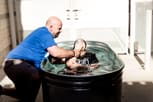There are few social movements in my lifetime that have unavoidably shaken me more than my perpetrator. Sometimes, I’m at a loss as well to say anything other than #MeToo. The experience of other women around me and the solidarity of so many leads me to a place of overwhelming gratitude that I fought the brutal battle to not dip back into the cycle of addition, delusion, minimization, guilt, shame, remorse, self doubt, and self loathing that comes from a place of deep harm at the hands of another human.
We can and should do better.
Sexual Abuse and Addiction
In recovery, I met Hannah, a victim’s advocate and coordinator for victim’s services. She knows “that not everyone is going to reach [her] door; we need to make sure that everyone is a door.”
Anne Minch, an LCSW specializing in trauma in the Louisville, KY area said about the movement “I’ve seen an influx of women in my counseling practice which is focused on sexual abuse recovery. [I’m] so proud of the brave women who have raised their voices and in doing so have empowered other women to do the same.”
The conversation needs to keep going. Conversation can and should lead to change. As awareness increases, so should the shedding of guilt and ending of the cycles of addiction brought on by faulty coping mechanisms.
Life After Abuse
Not only are victims of sex crimes more likely to use drugs and alcohol, but also in the process, substances become a quick, chemical reprieve from our trauma-affected realities. Substances became singular coping mechanisms for a lot of us.
Things like therapy and advocacy take time, but they are far more effective and hold healing, productive permanence for me, but it wasn’t always that way. Without the ability to mask my problems and the ubiquity of Post Traumatic Stress Disorder symptoms, I had to learn to let real coping mechanisms find their place in my life and to effectively deal with my trauma and the myriad of issues it breeds.
I had to have more conversations on physical agency, consent, boundaries, anger management, personal identity, and concepts of self and security than I’d ever had before in my life.
Women Facing Trauma as One
The #MeToo movement and several others have helped women identify each other and band together to work for a solution. Isn’t that in line with our primary purpose in recovery—to band together and work for a solution? I learned healthy coping mechanisms because people were only willing to recognize it as an “outside issue,” or separate from my recovery until succumbing to the helplessness, hopelessness and powerlessness of the entire ordeal leads to a relapse.
Coping mechanisms and resources have their place in recovery and we need to be attentive to our own biases and prejudice to ensure we’re not tossing around ineffective one-size-fits-all solutions to stop dismissing sexual violence and harassment as a women’s issue that only women should ever talk about, amongst each other or with HR.
If it happens to any of us, it inherently affects us all, like it or not. For both men and women, it affects our sisters, our mothers, sponsors, daughters, and friends. We need to do better for them, if it is them who has suffered or when it becomes them, and maybe one day we can log into our social media accounts and find more than just blame shifting, denial, and misaligned responsibility.
Changing Attitudes
We can and should do better to equip those who come after us and seek refuge in our serenity when they have none themselves. Dismissive attitudes about bodily entitlement, our faulty paradigms and pension towards victim-shaming or a lackadaisical sense of responsibility to help those in situations we passively endorse, expressly ignore, or actively avoid are damaging—and we all play a part, like it or not.
Just like the cycle of addiction, trauma has its own cycle. We need to do to do better to examine our unconscious biases, where we were not actively behaving badly, but still cause harm; and we need vigilance in assessing our values, attitudes, and ensure we create space for collaborative communication, productive, and empowering interactions.
We need to stop creating a safe haven to pretend we don’t see those who hugs the newcomer too long, those men who hop up to help the pretty woman at her first meeting, and those who joke about catching them between the shakes and sponsorship.
I have seen time and time again where we make space for small infractions, ignore transgressions in the name of “live and let live” or minding our own business, then when women are harmed and traumatized, we tell them it’s an outside issue though we witnessed the entire cycle right in front of us. I refuse to accept this.
It’s tragic that we have opportunities to hold each other accountable, albeit awkwardly, and don’t. It’s tragic that a society of people aiming to get better—a fellowship that saved my life—ignores women who’ve experienced sexual trauma and need additional support in order to avoid a relapse and prolong their sobriety. We can and should do better, by listening and hearing each other when we’re in pain. We can say #MeToo.
The #MeToo Movement
We can acknowledge the issue, and do something about it. We don’t have to watch cycles of trauma or cycles of abuse like we haven’t all suffered the self inflicted madness caused by the cycle of addiction, self-sabotage, self-loathing, and self doubt.
We’re here to get better and we don’t have time or space for archaic patriarchy in our progression. My sister soldiers are not the minority and we will not sit still, look pretty or guard your transgressions with destructive, permissive, and festering secrecy anymore.
This movement for us means holding on. It’s knowing that you are whole, even when you feel broken. It’s finding the places of powerlessness in life to harness personal power for empowering others and igniting an unwavering dedication to rise.








